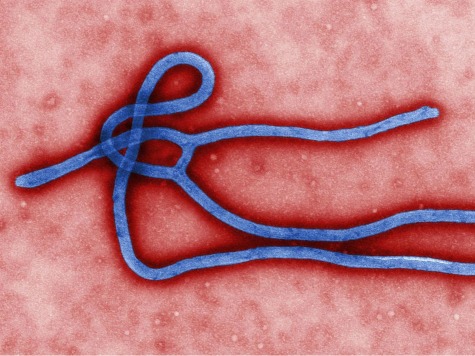The largest newspaper in Monrovia, Liberia, has published an outrageous conspiracy theory column arguing that the United States is directly responsible for scientifically engineering the Ebola virus in a bioterrorism lab and injecting Africans with it through the guise of vaccinations.
The wildly accusatory article, by Dr. Cyril Broderick, a former professor of Plant Pathology at the University of Liberia’s College of Agriculture and Forestry, claims the Ebola virus–and HIV–are products of the Cold War. Titled “Ebola, AIDS Manufactured By Western Pharmaceuticals, US DoD?” Broderick’s article claims–using evidence such as the science fiction novel The Hot Zone–that the Department of Defense unwittingly used Africans to test experimental bioweapons by pretending they were vaccinating them against disease. “Reports,” he argues, without actually citing any reports, “narrate stories of the US Department of Defense (DoD) funding Ebola trials on humans, trials which started just weeks before the Ebola outbreak in Guinea and Sierra Leone.”
He cites the 1996 Leonard Horowitz work Emerging Viruses: AIDS And Ebola: Nature, Accident or Intentional? to claim that a facility in Maryland had “a lot of problems with strange illnesses” during the Cold War, a clear sign that many of these diseases were the product of U.S. experimentation to Broderick. He also claims the book definitively proves “the existence of an American Military-Medical-Industry that conducts biological weapons tests under the guise of administering vaccinations to control diseases and improve the health of ‘black Africans overseas.'”
Broderick also accuses the World Health Organization (WHO) and Doctors Without Borders of bringing Ebola to Africa through vaccination programs. He asserts, too, that “many reports also conclude that the US government has a viral fever bioterrorism research laboratory in Kenema, a town at the epicentre of the Ebola outbreak in West Africa.”
Perhaps most outrageously, Broderick attempts to cite a real source, The Guardian, alleging that a report in the paper said, “The US government funding of Ebola trials on healthy humans comes amid warnings by top scientists in Harvard and Yale that such virus experiments risk triggering a worldwide pandemic.” A routine Internet search finds no evidence that such a sentence was ever written in the pages of The Guardian.
Broderick concludes, somehow, by calling for a class action lawsuit against Tulane University to combat the Ebola virus. “Africa must not relegate the Continent to become the locality for disposal and the deposition of hazardous chemicals, dangerous drugs, and chemical or biological agents of emerging diseases,” he rails.
The text, for Westerners, is undoubtedly outrageous and easily dismissible. It is not the first time for such rumors in Africa, however; the last time, it was discovered that the KGB had planted stories in African media, accusing the United States of inventing the AIDS virus. But for Africans, many of whom operate under assumptions that they are under the constant threat of Western exploitation due to a history of colonialism, such a report is not so easy to ignore. As experts have noted, much of the violent resistance to Western science that has led to such a rapid spread of the virus is the product of a rejection of what Africans perceive as Western “paternalism” in coming to their continent and offering medical care.
That the Liberian Daily Observer is currently featuring it on its front page is of particular concern. The Observer is Liberia’s largest newspaper, with a circulation of 30,000, mostly in the capital, Monrovia. Given the backdrop of panic into which this “report” is being disseminated, the consequences could be devastating for Liberia. The nation is already fending off significant distrust from the Liberian people–the kind of distrust that makes family members kidnap their own relatives out of hospitals to bring them to traditional herbalists for treatment they trust, the kind of distrust that triggers mob attacks on medical facilities run by the WHO and Doctors Without Borders and looting of healthcare buildings.
Running such a column in a climate of extreme distrust is, to say the least, unfathomably irresponsible on the part of the Observer. With such resistance from Africa’s communities to finding a cure, the Ebola virus will only continue to spread, and having claimed more than 2,000 lives already, Ebola can only grow as an existential threat to West African governments.

COMMENTS
Please let us know if you're having issues with commenting.